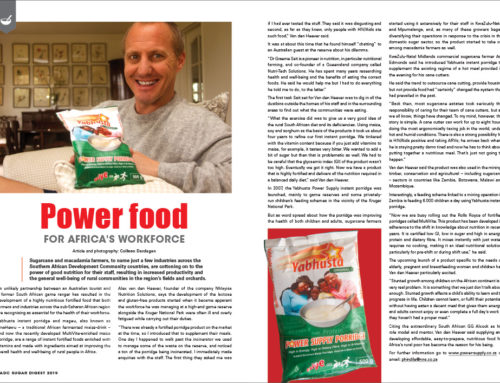The mining industry forms an integral part of the South African economy; with an estimated worth of R20.3 trillion. In 2017, mining contributed 8% to the country’s gross domestic product. Needless to say, that makes mineworkers an integral part of the country’s wellbeing, and if this workforce suffers due to ill health that results from insufficient nutrition, the whole country suffers.
Working in mines is physically demanding, and mineworkers often suffer from heat stress and heat strain due to dehydration. Also, long hours spent underground can have a detrimental effect on the mental wellbeing of mineworkers. In an extremely dangerous environment such as in a mine, where workers often work with heavy machinery in severe conditions, the slightest lapse in cognitive ability or physical strength could have disastrous effects.

It is therefore important to not only look after the physical health of mineworkers, but also their mental health. For this, they need health promotion programmes that address proper nutrition and hydration. These programmes need to educate mineworkers on how the harsh conditions that they are exposed to, coupled with inadequate knowledge and understanding of health and nutrition, can result in a vast array of health problems, such as diabetes, obesity, hypertension, cardiovascular disease and stroke, HIV, tuberculosis, cancer (such as lung, liver, and colon cancer), and skeletal abnormalities.
Mineworkers often start their shift in an already dehydrated state, and their blood sugar levels are often too low, which can lead to dizziness, fatigue, blurred vision, confusion, convulsions, and loss of consciousness, which could lead to serious injury on the job. While basic nutrition applies to almost everyone, due to their stressful and physically demanding work environment, mineworkers need a special diet to keep them going through the day.

For sustained energy levels, mineworkers need food that is high in low-GI (Glycaemic Index) carbohydrates. Low-GI foods ensure that the sugars that provide energy don’t move too fast through the body, ensuring sustainable energy for longer. Sustained blood glucose levels help prevent health problems such as diabetes, metabolic syndrome, reactive hypoglycaemia, insulin resistance, hyperlipidaemias, hypertension, cardiovascular disease, stroke, etc.
Mineworkers also need food that is high in protein. In the absence of fats or carbohydrates, the body can use protein for energy. While the average person only requires about 0.8g of protein/kg body weight per day, mineworkers, who are more active, require about the same as endurance athletes, which is 1.2 to 1.4 g/kg body weight per day, and in some cases the same as strength-training athletes, which can be as high as 1.6 to 1.7 g/kg body weight per day.
Typically, half of the body’s energy requirements are provided by fats. The fat stored in the body provides protection and insulation for internal organs, which can be damaged by physically demanding work such as mining. Fats are also responsible for absorbing certain vitamins (A, D, E, and K) and maintaining the body’s core temperature.
Mineworkers also need food that is rich in micronutrients that promote different health functions, such as strong and healthy bones, synthesis of haemoglobin, a healthy immune system, building and repairing muscle tissue, and protecting the body’s tissues against oxidative damage. Some micronutrients (vitamins C and E, and zinc, lutein, zeaxanthin, and omega-3 fatty acids) promote good eyesight, which is essential in poorly lit spaces such as mines, while others (such as the B-vitamins) aid cognitive functions. Vitamin C also helps protect the body against heat exhaustion, which is one of the biggest problems for mineworkers.
These essential components are found in our brand new enriched MultiVite porridge. These are foods that can be made quickly and easily during a lunch break, and only require adding water or milk. They will provide mineworkers with the energy they need for the day and keep them full for longer.
Mineworkers mostly come from poor households, and poor health or injury on the job, which can result in absenteeism, can have dire financial consequences for a family who depends on the income. Due to limited finances, they simply cannot afford the food that would provide them with the nutrition they need to deal with all the physical and mental challenges of the job. Fortunately, MultiVite, Yabhusta Mageu and Power Supply Porridge are affordable and can thus keep mineworkers healthy, energised, and full for a fraction of the price, and can therefore also give their families, and the country as a whole, financial security. Mineworkers are worth their weight in gold, and we need to treat them as such.
For more information on the new MultiVite porridge, please click here







Leave A Comment